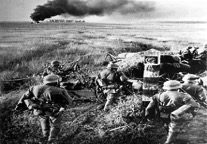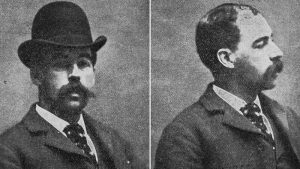Many things contributed to the fall of the Nazi Regime. People argue that Nazi ideals led to the failure of their plan for European dominance. Some say that it was the concept of “Lebensraum,” the need of living space for Germans, and others point out that the loss of World War II by Nazi Germany led to their downfall. All of these factors are true, but if we look deeper and focus in on some of the events that Nazi Germany took part in during World War II, we can pin the failed invasion of the Soviet Union, known as Operation Barbarossa, as one of the key contributing factors to the demise of Nazi Germany and everything the country stood for. This operation was an “all or nothing” operation, which meant that failure was not an option for Nazi Germany. Operation Barbarossa led to German Soldiers holding the fate of their country in their own hands as the very existence of Nazi Germany was at stake.1
In 1925 Hitler wrote the famous book Mein Kampf, which contained Hitler’s political beliefs and his plans for Germany. Hitler believed that Slavs were not part of the Aryan race, and he deemed them inferior. Mein Kampf emphasized the need for German living space, otherwise known as “Lebensraum.” To achieve this, the Germans would have to turn towards the East and focus on the Soviet Union, which would result in Hitler fighting a war on two fronts.2
The Germans began preparations as early as February 1941, anticipating that the invasion would commence during mid-May of 1941. However, due to the Balkan campaign, the date was pushed back to June 1941. The five-week delay shortened the time available to invade the Soviet Union. Hitler predicted a swift invasion, lasting only a few months, because of his rapid success in other parts of Europe. However, these successes led to Hitler being over confident, because he believed he was a political and military genius. Hitler didn’t anticipate war during the Soviet winter, and German soldiers lacked the adequate clothing and supplies to fight a war during the winter months. This would prove to be fatal to the German army as they were not prepared. On the other hand, the Soviets were also inadequately prepared. Although they had more numbers than their German counterparts, they lacked equipment or had poor quality equipment, and had worse training than the Germans. The quickly coming winter and with the Soviets lacking equipment and training, it was essential that the Germans achieved a quick victory.3

The initial offensive started June 22,1941. There were around four million German troops along with hundreds of thousands of Italian and Romanian troops. The Germans split themselves into three army groups, turning their focus to different parts of the Soviet Union. Army Group North would head to Leningrad, Army Group Center would head towards Moscow which was the Soviet capital. Army Group South would head south into Ukraine which was the center for Soviet industry and mining and had sufficient farmland for Hitler’s concept of “Lebensraum.” The Soviet south was also very rich with petroleum which was another deciding factor in the invasion. At first the invasion along the 1,800 miles took everyone in the Soviet army by surprise as the Germans were able to catch the Soviets unprepared.4
The first few weeks of the invasion were swift and fast, but by mid-July a series of rainstorms slowed the German advance deep in the Soviet Union. The rainstorms made the path treacherous for the Germans as the dirt and sandy roads turned muddy, making it difficult for German wheeled vehicles to advance. The Nazi Army made little progress with their offensive. Soviet troops would often do as much as they could to slow down the German advance, which included them burning crops, destroying bridges, and evacuating factories as they retreated. Furthermore, steel and munition plants in the West were destroyed and shipped to the East. The Soviets also destroyed most of their rail stock, depriving the Germans of use of the railroad system. Despite the Soviets doing everything in their power to slow the German attack, it still wasn’t enough, and by mid-July, the Germans had advanced more than 400 miles. The Germans were only 200 miles west of Moscow, the Soviet capital. There was still time to make significant advances before the onset of winter, but the opportunity broke down when Hitler and his generals had disagreements on where the German army would shift its focus to next. A quick victory was still essential to the German Army.5

Ultimately, after the Battle of Vyazma, which was a twenty-day battle that led to a German victory, the Germans had a clear path to Moscow. Moscow was not only the capital and largest city of the Soviet Union, but it was also one of the main military and political objectives for the Axis powers during the invasion. In early December 1941, the Germans were at the gates of Moscow with many of the troops exhausted and tired. Many of the Soviet forces were fresh, yet the Germans were so close to Moscow, it was hard to resist advancing to capture Moscow. Victory was in the Soviets’ sight, especially because of the onset of winter in the Soviet Union, which is one of the coldest countries in the world. The Germans suffered greatly during this harsh Soviet winter. The sub-zero temperatures were the most severe in decades. Frostbite decimated German troops, many of whom were already exhausted or had fallen ill due to the temperatures. Provisions were also not made for the German troops. They had very little clothing for the winter because Hitler and his generals thought the invasion would be swift. Many troops starved or froze to death. The freezing temperatures also immobilized many of the Germans’ transportation, artillery, and aircraft. In addition, many of the German supply lines were vulnerable to attacks from behind. Getting provisions to the troops up front was a difficult task for the Germans. The number of casualties the Germans faced were unheard of among the Nazis, as they barely had any losses in their previous campaigns during this war. The Soviets’ experience with the poor weather differed from the Germans. The weather was perfect for the Soviet Red Army as they were used to it and tended to fight better in freezing temperatures. 6

The turning point for Operation Barbarossa came as the drive to Moscow started to stall. The Soviets were poised for a counter offensive and were able to exploit the Germans when on December 6th, 1941, Gen. Georgy Zhukov of the Soviet Union launched a counter offensive against the Germans that the German army was never able to come back from. Many of the troops used in the counter offensive were Siberian troops who were very effective fighting in colder weather. This counter offensive drove the Germans away from Moscow and ultimately pushed them back all the way to Berlin. 7
So this leads back to the question of whether Operation Barbarossa was Hitler’s biggest failure that cost Nazi Germany World War II? The short answer would be yes, but to expand on this, we can see that Hitler and his generals made many mistakes and mishaps. Their goal to invade and overtake the Soviet Union was unrealistic from the beginning. The only reason why success seemed realistic was the fact that before Operation Barbarossa, Germany was dominating Europe and they weren’t experiencing any significant losses in these battles. The German Army was a war machine that was decimating their enemies. For this very reason Hitler and his generals grew overconfident. They were so confident they thought Operation Barbarossa wouldn’t be a long invasion and that there weren’t going to be many casualties. However, Hitler’s thinking was wrong. The Germans experienced more casualties on the Eastern front fighting the Soviets than they did on any other front. Overconfidence led Hitler to make irrational decisions for the German Army that made them not only lose the war, but also it led to a turning point in which Hitler would lose Germany as he knew it. Winter played a huge part as many of the German preparations were not geared towards fighting during the winter months. The Soviets were better suited to fight during the winter than the Germans. Without proper clothing, provisions, and other equipment needed to wage a war during the Soviet winter, Germany began to struggle towards their demise. Ultimately, Hitler was so obsessed with “Lebensraum” that he couldn’t grasp the consequences if he had failed. However, all of what Hitler had hoped for Germany would be gone by the time Germany fell to the Soviet Union.8
- Martijn Lak, “Operation Barbarossa and Germany’s Defeat in the East,” German History, Volume 29, Issue 2 (June 2011): 335–337. ↵
- H.W. Koch, “Operation Barbarossa-The Current State of the Debate,” The Historical Journal 31, no. 2 (1988): 388-390. ↵
- Britannica Encyclopedia, s.v. “Operation Barbarossa,” by John Graham Royde-Smith. ↵
- David M. Glantz, Operation Barbarossa:Hitler’s Invasion of Russia 1941(The History Press: Stroud, UK, 2011), 31-42. ↵
- Wikipedia, 2018, s.v. “Operation Barbarossa.” ↵
- Wikipedia, 2018, s.v. “Operation Barbarossa.” ↵
- Britannica Encyclopedia, s.v. “Operation Barbarossa,” by John Graham Royde-Smith. ↵
- Robert Smith Thompson & Alan Axelrod, Nazi Germany(New York;2018), 240-251. ↵



53 comments
Daniel Matheu Baldor
This is the part of the WWII that I like more. I have watched a lot of films and read a lot of books about how Hitler made these mistakes that costed him the WWII. The Battle of Stalingrad was the Hitler’s key to win the war and, just as it happened with Napoleon one hundred years ago, the winter ruined it. After it, it began the downfall of the Nazis, and, with it, the beginning of the end of the WWII.
Aiden Dingle
Operation Barbarossa was really the downfall to Hitler’s war and I think is was really lead to Germany losing WW2. Hitler starting a war on 2 fronts was a mistake itself but I could see how he thought he would invade Russia quickly due to how fast he took France. But, just crossing into Russia and starting that fight was a logistical nightmare for the Germans, mostly because they couldn’t resupply their troops efficiently and with their army already spread so thin, starting another full scale invasion of Russia just wasn’t really logical for Germany at the time.
Andrea Degollado
This article was very interesting to read and had me hooked from the start. I had never really hear of Operation Barbarossa but this article did a great job in informing me and catching me up. I think its crazy to think how close the Germans actually were in winning the war. This article was very well written and developed and did a great job in keeping the reader hooked. Good job!
Antonio Holverstott
The weather played a key part in preventing Nazi Germany from successfully overthrowing the Soviet Union during World War II. Numerous storms during the warmer months made travelling difficult for their motor vehicles and soldiers to traverse the Russian landscape, and the Russian winter with its intense snowstorms and low temperatures made living, travel, and war difficult for Nazi soldiers. If the weather was not as severe as it was during this operation, the Nazi might have successfully taken the USSR and solidify a long slot in history. This security would have given them the ability to continue their horrendous acts in the form of the Holocaust for a longer time.
Samuel Vega
I believe Adam has a strong point about Hitler and how the invasion of the Soviet Union ultimately failed. Germany became over confident in their ability to defeat the Soviets based on their quick successes in parts of Europe. Hitler and his regime thought the battles would be quick and did not anticipate the cold weather, the lack of supplies and the Serbians ability to fight in the frigid temperatures were all factors that led to Germany being pushed back. We also saw the over confidence in Japan in the Pacific at the Battle of Midway. Tactical errors were made by Japan in fighting the United States at Mid-Way. Going to into Midway Japan thought the war would be coming to an end.
Micheal Baladez
I was attracted to this article due to the fact that I wanted to learn more about the catastrophic failure of the Nazi invasion of the Soviet Union. I wanted to learn more about the failure primarily so I can relate more to the memes that acknowledge the fact that Hitler tried to invade one of the world’s coldest countries during the coldest time of the year, wintertime. I also found the mention of the counter-attack by the Russians to be highly descriptive and informative. Overall a well put together article.
Raul Colunga
Great article that provides insight into an important event in history. I have seen movies like Enemies at the Gate, but I did not know the details like troop numbers or how the USSR tried to delay the Nazis. Something I found interesting was that there were Italians and Romanians helping out the Nazis with the invasion. It is crazy to imagine a force of over three million troops who suffered from winter conditions and died trying to win a losing battle.
Seth Roen
I due agree with you, and the start of the end of the Third Reich would be the ill-prepared Operation Barbarossa. However, like would the Russian did to Napolean, they would have kept retreating and burned everything thing down. It’s a mystery exceptionally this Hilter believe in history repeating itself, hence why he named the operation Barbarossa, a Holy Roman Emporer, and not learning from Nepolean’s greatest mistake.
Aaron Sandoval
This article presents the timeline of events very well and does a good job of explaining why Operation Barbarossa was a major factor in the fall of the Nazi regime. It was good to add clarity to your reasoning in the closing paragraph and go into detail on why the actions taken by Germany were unrealistic and despite being an amazing fighting force capable of covering ground at extraordinary speeds through their blitzkrieg tactics were mistaken in attempting to invade Russia.
Mark Dominguez
A very interesting a and informative article, I had heard about Operation Barbarossa but I was not very familiar with the details. It is interesting to see how close the Germans actually were to winning the war, it seems that this operation was a real turning point in it. It is astounding how much of an impact the weather had on the outcome of the invasion.
Tyler Caron
I’m glad there is an article that talks about something that Hitler failed at because it seems like most stories are about what he accomplished as a world leader. It talks about everything he did wrong which I feel is doing the world good because he was a terrible human that no one should have let in charge of the country. Its a good note that all his soldiers were tired after fighting in the freezing cold for so long.